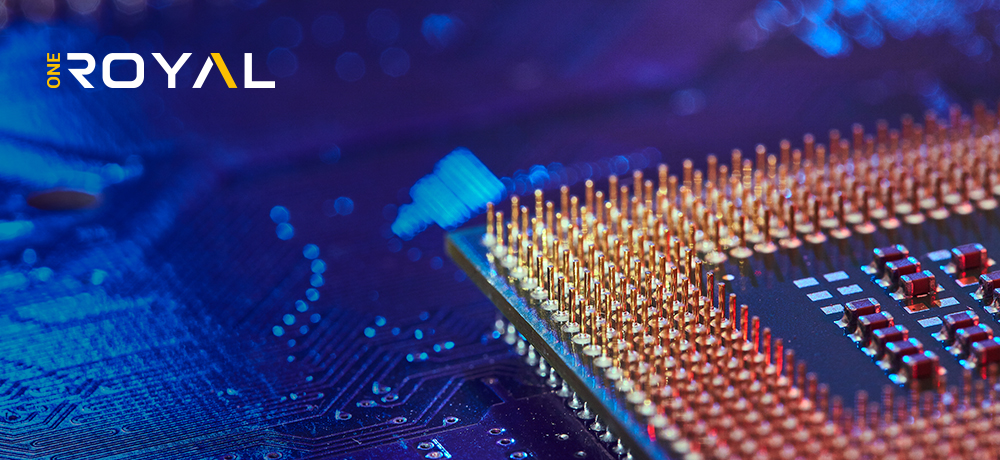The Covid-19 pandemic has both caused the demand for semiconductors to soar and significant interruption in the supply and value chains, leading to shortages and spillover effects in IT and automotive sectors and pushing Europe to take steps toward a more resilient microelectronics industry.
Currently, the semiconductor market is in the hands of two companies, Taiwanese TSMC and South Korean Samsung, both clutching 80% of global production.
But American company Intel is becoming the key player in creating a next-gen European chip ecosystem and addressing supply chain and dependency issues.
Starting The Eurotrip With A Bang
On March 15, American powerhouse Intel announced an unprecedented investment in Europe, with plans to produce semiconductors and fund research in more than 4 EU countries.
It revealed in a press release “plans to invest as much as 80 billion euros in the European Union over the next decade along the entire semiconductor value chain – from research and development (R&D) to manufacturing to state-of-the-art packaging technologies”.
The first stage will be a 17 billion-euro semiconductor mega-factory in Germany together with a new R&D and design hub in France with investment in associated services in Ireland, Italy, Poland and Spain.
To give you an idea of the size of this investment, Tesla’s factory in Berlin was a 9 billion euro project.
In-Line With Europe’s Digital Sovereignty Goals
The “Chips Act”, proposed in February this year by the European Commission, has earmarked 43 billion euros in public and private funding for the semiconductor sector. The aim is to double the EU’s share in global chip production from the current 9% to nearly 20% by 2030.
It’s therefore easy to understand how Intel fits into the bigger picture. And the American company will be super-subsidized by the EU for approximately 40% of its investment.
But how is an American company the main actor in the EU’s efforts to create a strong and independent tech manufacturing base? There are indeed many European semiconductor manufacturers: STMicroelectronics, Soitec, Infineon, NXP. They mainly manufacture semiconductors for the automobile or for the industry of the future.
Which Companies Are Involved in The Master Plan?
Intel plans the acquisition of Tower Semiconductor in Italy (Tower has a significant partnership with STMicroelectronics). In France, Intel plans to invest in research and Atos company on supercomputers.
But the Chips Act is also aimed at boosting and sustaining European players:
- British Chip designer ARM (ARM), is essential in the future of the smartphone and gaming industry. Its acquisition by Nvidia was blocked by the EU.
- Dutch company ASML (ASML), is the only company in the world to produce EUV lithography machines that “engrave” chips.
- French Soitec (SOI.PA), produces semiconductor raw material silicon and announced a new production plant in Grenoble.
- French-Italian STMicroelectronics (STM.BN) just secured a 600 million-euro loan from the EIB and had its demand from Apple triple in the past five years.
What Analysts Are Saying
The European Chips Act offers relatively little guaranteed to fund. TSMC, Samsung and Intel spend tens of billions of dollars per fab (fabrication plant). So €43bn is a relatively small amount in the grand scheme of things, and they’ll need a lot of private money to bolster it up to that amount. Cyrus Mewawalla, head of thematic research at GlobalData.
The presence of a next-generation semiconductor fabrication plant in Europe would have positive spill-over effects, driving investment in European supply chains and act as a magnet for scarce talent.” Jan Frederik Slijkerman, ING analyst
You could see them putting some money into some of the smaller fabs in Europe to help build them out, but a lot is going to depend on whether the politicians want the kudos of landing a mega Intel fab, or if they’re interested in boosting the ability of engineers at European companies like ST Micro or Infineon to build the chips which BMW needs for its next electric vehicle. Alan Priestley, VP analyst at Gartner
Disclaimer: This article is not investment advice or an investment recommendation and should not be considered as such. The information above is not an invitation to trade and it does not guarantee or predict future performance. The investor is solely responsible for the risk of their decisions. The analysis and commentary presented do not include any consideration of your personal investment objectives, financial circumstances or needs.





